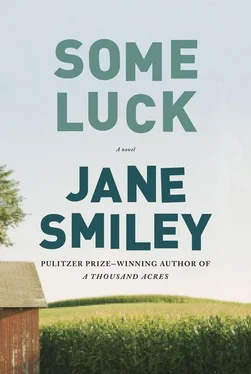WALTER HADN’T STAYED in a hotel since his return from Europe, and he’d only stayed in a hotel once there. This place in Mason City wasn’t at all like that place in Amiens where he had stayed while on leave in France (and didn’t know what to do with himself except walk around the town and stare at things that had been there for hundreds of years). And it wasn’t that strange place on the park that didn’t look like any building Walter had ever seen. It was just a hotel, with a bathroom down the hall, one window looking out onto the street, and two beds. Rosanna had Joey in the other bed, and Walter had this bed to himself. They had let Frankie wrap up in a blanket and sleep on the floor, though not between Walter and the door. Frankie was a wild one, no two ways about that. He made Walter and his brothers look domesticated by comparison.
Probably the street was the reason Walter wasn’t sleeping. Cars went up and down the street like you wouldn’t believe, all night long, as if these people didn’t have anything to do during the day, and maybe they didn’t. What did they have to do other than buy and sell the sorts of things Walter produced on his farm — corn and oats, or not those, but pork and chickens and beef and eggs and cream and butter? You walked down the street in a town like Mason City and you wondered what went on there. Walter had become just the sort of curmudgeon he used to disdain his father for being — the farm was the source of all good things, and what you couldn’t grow or make there, you didn’t need. People in town had too much time on their hands, so they built themselves stores and picture shows and even parks, just to be doing something. But really they weren’t doing anything. Just using up stuff. His father’s voice went on in his head, but it sounded like his own voice, and it was accompanied by a visceral feeling of injustice that Walter wasn’t used to, and probably wouldn’t feel if farm prices were higher. Why, for example, was an egg now worth three cents to Dan Crest, but he had to pay seventy-five cents for two boiled eggs for breakfast in this hotel? He didn’t know many farmers who went anywhere, but those who did were proud of fixing their own baskets of food, and always said it was better than you could get wherever you were going. And it was. But Walter resented that part of it was that if you were a farmer you couldn’t afford decent food, wherever you were going. He fell asleep, and woke up before dawn wondering where he was and what he had to get up and do, but there was nothing. Finally (he could hear by the window), the streets were quiet, but he, of course, couldn’t sleep a wink. There were two alternatives for passing the time — worrying about Ragnar and the outside work, or worrying about Irma alone in the house. As dawn broke, it felt like he opted for both.
WHEN FRANK FINALLY WOKE UP and sat up, he said, “What’s that?”
Mama said, “That’s the town-hall clock, striking eight. You boys slept a long time.”
Papa said, “I was up before dawn.”
“What time was that?” said Mama.
“Not six, anyway. I heard the clock strike six.”
Frank didn’t understand time. Mama and Irma showed him on the kitchen clock how the hands went around. If it had been up to him, he would have put the one at the top. He didn’t understand why the twelve was there. It was like sledding down a hill — the hand should start with one and go down. When he asked Mama about it, she said that he should think of the twelve as also a zero, even though the only zero on the clock was in the ten. He sometimes sat at his breakfast or dinner gazing at the clock and trying to figure it out. Half of what grown-ups said didn’t make much sense, if you asked Frank. For example, he liked stories, but quite often there was some part of the story that just seemed wrong. Irma told him a story called “The Pied Piper of Hamelin.” In it, a man comes and plays such a song on his pipe that the rats are driven crazy by it, and they throw themselves into the river. Frank thought that this was just barely possible. The next thing that happens is that the townspeople don’t pay him. Frank knew that that could easily happen — Papa talked all the time about whether he was going to get paid for his crops or not. The next thing that happened was that the Pied Piper played a song that made all the children follow him out of town and disappear. Only three boys — one who was lame and couldn’t keep up, one who was blind and couldn’t see the way, and one who was deaf and couldn’t hear the song — stayed behind. It was this part that Frank couldn’t accept. What about the boy who just didn’t want to? The boy who was contrary? Irma never mentioned that boy, until Frank had spoken up and said, “I wouldn’t have gone,” and then she just laughed.
“Time to get dressed,” said Mama. “The service starts at ten, and I want to walk around for a bit.”
“What’s for breakfast?” said Joey.
“Plenty of things,” said Mama. “Let’s go out and have a look.”
REVEREND SUNDAY WAS more impatient. He seemed angry, and then it turned out that he was angry at the devil, who was present in the hall and holding people back from the stage. Of course, the devil seemed like a nice enough fellow, said Reverend Sunday, good-natured and whispering doubts in everyone’s ears. Simple doubts — my life is pretty good, I like my pleasures, I’m not doing anyone any harm, I’ve never passed out from drink once in my life, I’ve got a job or a husband or an automobile or whatever. I’m young — I’ve got years ahead of me to get this done. The devil always had such a reasonable voice, and so did Reverend Sunday for a while. He said, “I know the devil. The devil is always trying to make himself a friend of mine, and he isn’t that, but I know him well.” And then his face went dark, and he started arguing with the devil, making the devil tell everyone what Hell was like, how it wasn’t a simple place at all, where things were easy enough, it was a terrifying, black, burning place, and you want to talk about having years ahead of you, well, all the years you might waste before you got saved (if you ever did get around to it) were as the blink of an eye compared with those years in Hell — they didn’t even have years in Hell, they only had eons. Now he started yelling at the devil, telling him to get out of this room and out of these people and away from Reverend Sunday himself: “Get thee behind me, Satan!” And he turned his back and jumped about, as though Satan were beating him, and then he spun around and raised his arm, and began beating Satan. Next to her on the seat, Joey started crying again, but Rosanna felt she was stuck with her eyes open and her hand on her mouth. The next thing she knew, she was standing up and she had Joey by the hand. As she left the pew, two people reached out for Joey and took him, and a voice said (a kindly voice), “He’s too young, ma’am, but you go ahead,” and so she did, up the aisle, toward the stage. And Reverend Sunday changed again — after kicking Satan off the stage, he stood in front of them and lifted up his arms and shouted thanks to the Lord for speaking to the people through him.
The crush was suffocating, but reassuring rather than frightening. Men at the end of every row of seats gently guided them and encouraged them, and if someone was stumbling or weeping too much to see where he or she was going, one of these men took the elbow and steadied the person. Up by the stage, there were places to kneel, and then the choir started singing a song Rosanna did not know, but a beautiful one, four-part harmony, and some of the people around her opened their mouths and sang along, knowing the words. What Rosanna said was “Mary Elizabeth, I know you have gone to Heaven now, just now in this last minute, I know you have left my side and gone to Heaven, and that is your home.” And for years after that, she remembered that moment when Mary Elizabeth took her arms from around her neck and flew away.
Читать дальше












